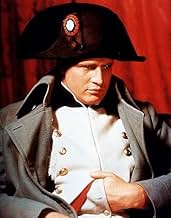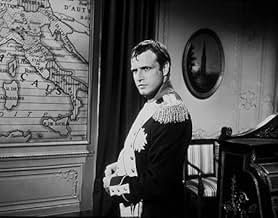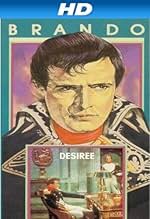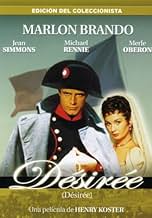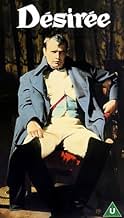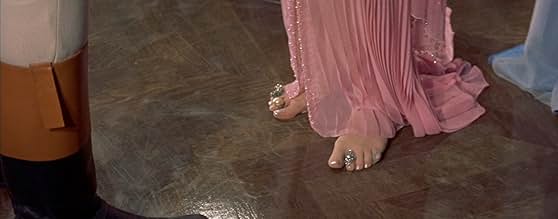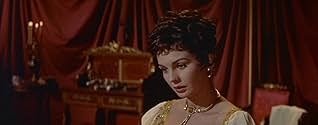AVALIAÇÃO DA IMDb
6,4/10
3,8 mil
SUA AVALIAÇÃO
Desiree Clary se apaixona por Napoleão mas casa com Bernadotte, enquanto Josefina casa com Napoleão, torna-se Imperatriz e é rejeitada por não gerar herdeiro.Desiree Clary se apaixona por Napoleão mas casa com Bernadotte, enquanto Josefina casa com Napoleão, torna-se Imperatriz e é rejeitada por não gerar herdeiro.Desiree Clary se apaixona por Napoleão mas casa com Bernadotte, enquanto Josefina casa com Napoleão, torna-se Imperatriz e é rejeitada por não gerar herdeiro.
- Direção
- Roteiristas
- Artistas
- Indicado a 2 Oscars
- 2 indicações no total
Leon Alton
- Party Guest
- (não creditado)
Louis Borel
- Baron Morner
- (não creditado)
Sven Hugo Borg
- Aide
- (não creditado)
Peter Bourne
- Count Brahe
- (não creditado)
Paul Bradley
- Party Guest
- (não creditado)
- Direção
- Roteiristas
- Elenco e equipe completos
- Produção, bilheteria e muito mais no IMDbPro
Avaliações em destaque
Filmed when CinemaScope's original ratio was still in use by Twentieth's cinematographers and with production values ladled on with an apparently generous budget (though no authentic European locations), "Desiree" is somewhat of a disappointment in many respects. Surprisingly Merle Oberon, as Josephine, remains in my memory as giving a touching (and, of course, glamorous) performance, but virtually everyone else (including Jean Simmons, one of my special favorites) fails to impress. Perhaps the emphasis on recounting the exploits of Napoleon Bonaparte from the perspective of one of his early, and unrequited, romantic conquests is the reason the whole enterprise seems like an undistinguished piece of overstuffed furniture...comfortable but hardly worthy of praise as an artisan's finest achievement. As an entertainment, typical of the Fifties, it was worth the price of admission when first released but I rather doubt that I'll join a chorus requesting Fox Home Entertainment to give this a DVD release in a widescreen format.
Recently I viewed for the umpteenth time CONQUEST with Charles Boyer's brilliant Oscar-nominated performance as Napoleon. I have just seen DESIREE for the first time and am intrigued by Brando's take on the man. The make-up department has given him a Napoleonic nose bridge and he has supplied the rest. He plays N. as a moody, passionate, obsessed man, but plays him in a quiet, controlled manner. Only twice in the film does he lose his temper. This is a performance I will go back to and study. Brando's insight is as always stellar. His Napoleon believed so much in his "destiny," that he assumed the rest of the world would fall into place around that obsession. Fascinatnig to watch.
The film itself is a pretty, early CinemaScope epic with Oscar-nominated Art Direction and Costume Design. Jean Simmons does her very best to bring this woman to life, but as others here have observed, Desiree was a rather dull child, noted for her beauty, and little else. That her life was a Cinderella story (from milliner to Queen of Sweden) is of no doubt, but she never seemed to have deserved her good fortune. It is really Brando's film. He has 19 scenes and makes the most of every one.
If you are a Brando or Napoleon fan, do see it, but don't expect much from the story. It's pretty straight-forward with little drama (though the circumstances make for much drama if written properly).
The film itself is a pretty, early CinemaScope epic with Oscar-nominated Art Direction and Costume Design. Jean Simmons does her very best to bring this woman to life, but as others here have observed, Desiree was a rather dull child, noted for her beauty, and little else. That her life was a Cinderella story (from milliner to Queen of Sweden) is of no doubt, but she never seemed to have deserved her good fortune. It is really Brando's film. He has 19 scenes and makes the most of every one.
If you are a Brando or Napoleon fan, do see it, but don't expect much from the story. It's pretty straight-forward with little drama (though the circumstances make for much drama if written properly).
My first introduction to this stroy was when my best friend gave me a copy of a very battered "Desiree" by Annemarie Selinko. When I found this movie, I was skeptical. I love the book, and most often, when books are made into movies, they are ruined. I was pleasantly surprised to find that the movie fit in so well with the book, and in fact used some of the same dialogue.
I felt that all of the actors did a remarkable job. Desiree was almost exactly the way that I had pictured her. Jean-Baptiste was also very like the image I had previously formed. Napoleon was amazing. He was so like the real Napoleon, I didn't have any trouble beliving that it really was him. Even though there were some things left out, like the end of the book and therefore the end of the story, I enjoyed it very much. I would not object to seeing this movie more, and it made my love for the book increase a great deal.
If you loved the movie, and even if you didn't, I would suggest getting a copy of the book. The romance between Desiree and Napoleon is much more pronounced as well as Desiree's love for Jean-Baptiste. The story-line is the same, but the end gives you the much needed satisfaction of seeing Desiree back in Sweden.
In my opinion, this is a first-rate movie, and I reccommend it to all.
I felt that all of the actors did a remarkable job. Desiree was almost exactly the way that I had pictured her. Jean-Baptiste was also very like the image I had previously formed. Napoleon was amazing. He was so like the real Napoleon, I didn't have any trouble beliving that it really was him. Even though there were some things left out, like the end of the book and therefore the end of the story, I enjoyed it very much. I would not object to seeing this movie more, and it made my love for the book increase a great deal.
If you loved the movie, and even if you didn't, I would suggest getting a copy of the book. The romance between Desiree and Napoleon is much more pronounced as well as Desiree's love for Jean-Baptiste. The story-line is the same, but the end gives you the much needed satisfaction of seeing Desiree back in Sweden.
In my opinion, this is a first-rate movie, and I reccommend it to all.
Henry Koster directed many films with considerable charm and flair... His attempts at drama were for the most part less successful but always visually pleasant... He was nominated for an Academy Award for directing "The Bishop's Wife" in 1947... His reputation as a skilled artist led to his assignment as director of the first film in CinemaScope, "The Robe."
Koster does manage to keep the dynamism of "Désirée" and is excellent on both the technical level as on the screen acting... The film won Oscar Nominations for Best Art Direction-Set Decoration, Color & Best Costume Design...
His high moment of the film was 'The Coronation Ceremony' where after the blessing of the crowns Napoleon seizes the crown from the Pope Pius VII and crowns first himself, then Josephine (Merle Oberon), Napoleon's first wife... (This petite brunette looked particularly ravishing as the empress).
Marlon Brando proved his versatility playing the great French soldier-statesman, a man insatiably ambitious, exceptionally intelligent, prompt to make decisions... Brando's performance is cool, calculating, compulsive, using a calm, measured English accent, providing the role its wise temperature of the most celebrated personage in the history of France & Europe...
British actor Michael Rennie plays the revolutionary general Jean-Baptiste Bernadotte with a noticed antipathy for his rival... Bernadotte shifts his allegiances, forming alliances with Russia, Great Britain & Prussia, contributing in the defeat of Napoleon at the Battle of Leipzig...
Jean Simmons - lovely as ever with her delicate beauty - gives the story fluid charm of a seventeen-year-old girl to a self-confident woman... We see her running through the streets of Marseilles, growing up in the outcome of the French Revolution, recording her daily written account of events, witnessing Napoleon's arrest...
Rescued from the threat of a jump into the Seine, Désirée rejects Napoleon's advances, and marries Count Bernadotte, now a Marshall of France...
Désirée was a romantic figure involved with two opposite characters: one as Emperor of France with an eternal search for wars and glory, and a king, uncertain sometimes about his capacities, with the necessity of a beloved queen besides him...
If not viewed as a history lesson, this fictionalized biopic is good entertainment and at least a point of departure for a study of a great French leader...
Koster does manage to keep the dynamism of "Désirée" and is excellent on both the technical level as on the screen acting... The film won Oscar Nominations for Best Art Direction-Set Decoration, Color & Best Costume Design...
His high moment of the film was 'The Coronation Ceremony' where after the blessing of the crowns Napoleon seizes the crown from the Pope Pius VII and crowns first himself, then Josephine (Merle Oberon), Napoleon's first wife... (This petite brunette looked particularly ravishing as the empress).
Marlon Brando proved his versatility playing the great French soldier-statesman, a man insatiably ambitious, exceptionally intelligent, prompt to make decisions... Brando's performance is cool, calculating, compulsive, using a calm, measured English accent, providing the role its wise temperature of the most celebrated personage in the history of France & Europe...
British actor Michael Rennie plays the revolutionary general Jean-Baptiste Bernadotte with a noticed antipathy for his rival... Bernadotte shifts his allegiances, forming alliances with Russia, Great Britain & Prussia, contributing in the defeat of Napoleon at the Battle of Leipzig...
Jean Simmons - lovely as ever with her delicate beauty - gives the story fluid charm of a seventeen-year-old girl to a self-confident woman... We see her running through the streets of Marseilles, growing up in the outcome of the French Revolution, recording her daily written account of events, witnessing Napoleon's arrest...
Rescued from the threat of a jump into the Seine, Désirée rejects Napoleon's advances, and marries Count Bernadotte, now a Marshall of France...
Désirée was a romantic figure involved with two opposite characters: one as Emperor of France with an eternal search for wars and glory, and a king, uncertain sometimes about his capacities, with the necessity of a beloved queen besides him...
If not viewed as a history lesson, this fictionalized biopic is good entertainment and at least a point of departure for a study of a great French leader...
The strange thing about this movie is that it really is what its title promises -- the story of Desiree, and nothing more. Made in the dark years before the feminist movement, (indeed, in the worst days of the feminine mystique) the film makers seem to assume that the "ideal" woman is warm, impulsive, kittenish, flirtatious and yet non-sexual. Desiree is forever stuck at the end of childhood. She lives through great events but her "womanly" nature makes her ignore everything but her own physical comfort. She is Scarlett O'Hara without the suffering, cruelty or ambition, and Natasha Rostov without the fellow-feeling, patriotism and mystical sympathy for others. It's odd how you feel enchanted by her, and yet you feel disgusted with yourself for wanting a girl who remains infantile in so many ways. Truly a guilty pleasure.
Some of the things Desiree says in this movie are beyond belief. For example, after she becomes Princess of Sweden, her husband suggests that she needs some tutors, and she cries, "I haven't learned anything since I was ten!" And like, who is supposed to stand up and cheer? You could be the worst sexist pig in the world and this movie would make you feel like Anna Quindlen.
Or take the scene where the Swedes arrive in the middle of the night and tell Marshall Bernadotte (a superb Michael Rennie) that he is now in line to be King of Sweden. Bernadotte tells Desiree, his wife, to hurry up and get dressed. "Put on anything, you understand?" And she wails, "no, no, I don't understand anything!" Some other comments have said Jean Simmons is "whining" in this movie. But it's much worse than that. She's really pure feminist Kryptonite! The whole point is that men find her irresistible because she always, always, plays dumb and does nothing but bleat about being hungry, tired, or confused.
Problem is, Jean Simmons is just so natural and so attractive that it sort of goes down easy. You really do find yourself wanting to hug her every other scene, if you're a man anyway. If you're Anna Quindlen you probably just want to slap her. She's the feminist anti-Christ.
At least she's not a blonde!
Some of the things Desiree says in this movie are beyond belief. For example, after she becomes Princess of Sweden, her husband suggests that she needs some tutors, and she cries, "I haven't learned anything since I was ten!" And like, who is supposed to stand up and cheer? You could be the worst sexist pig in the world and this movie would make you feel like Anna Quindlen.
Or take the scene where the Swedes arrive in the middle of the night and tell Marshall Bernadotte (a superb Michael Rennie) that he is now in line to be King of Sweden. Bernadotte tells Desiree, his wife, to hurry up and get dressed. "Put on anything, you understand?" And she wails, "no, no, I don't understand anything!" Some other comments have said Jean Simmons is "whining" in this movie. But it's much worse than that. She's really pure feminist Kryptonite! The whole point is that men find her irresistible because she always, always, plays dumb and does nothing but bleat about being hungry, tired, or confused.
Problem is, Jean Simmons is just so natural and so attractive that it sort of goes down easy. You really do find yourself wanting to hug her every other scene, if you're a man anyway. If you're Anna Quindlen you probably just want to slap her. She's the feminist anti-Christ.
At least she's not a blonde!
Você sabia?
- CuriosidadesAlthough Marlon Brando didn't take his role seriously--despite every effort by director Henry Koster--"Desiree" outgrossed his other 1954 film, "Sindicato de Ladrões (1954)."
- Erros de gravaçãoNapoleon didn't conceive of the idea of attacking Italy. France had been fighting Austria in the War of the First Coalition since April 1792. France and Austria had armies facing each other in northern Italy. Napoleon was appointed to command the French army in Italy on March 1, 1794. he took command on the 26th and proceeded to inflict a series of defeats on the Austrian Army in the eastern Po River valley.
- Citações
Count Brahe: You will enjoy life in Sweden, madame. Stockholm is called the Venice of the north.
Desiree Clary: [Shivering] I prefer the Venice of the south!
- ConexõesFeatured in Biografias: Darryl F. Zanuck: 20th Century Filmmaker (1995)
Principais escolhas
Faça login para avaliar e ver a lista de recomendações personalizadas
- How long is Désirée?Fornecido pela Alexa
Detalhes
- Data de lançamento
- País de origem
- Idiomas
- Também conhecido como
- Desirée, la amante de Napoleón
- Locações de filme
- Château de Fontainebleau, Fontainebleau, Seine-et-Marne, França(location shooting)
- Empresa de produção
- Consulte mais créditos da empresa na IMDbPro
Bilheteria
- Orçamento
- US$ 2.720.000 (estimativa)
- Tempo de duração1 hora 50 minutos
- Cor
- Proporção
- 2.55 : 1
Contribua para esta página
Sugerir uma alteração ou adicionar conteúdo ausente

Principal brecha
What is the French language plot outline for Désirée, o Amor de Napoleão (1954)?
Responda

